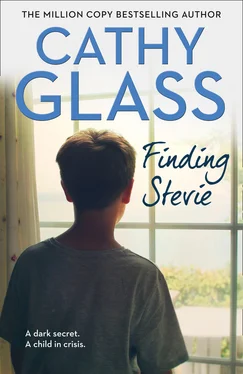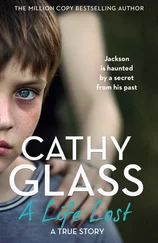‘Gran and Grandpa don’t. I had to use my phone credit to get online cos he kept switching off the router at night. He thought it would catch fire.’ He raised his eyebrows in exasperation.
‘We all have different ways of doing things,’ I said, and led the way into our kitchen-diner. To a younger person who’d grown up with computers, routers and mobile phones, switching off the wi-fi at night would seem ludicrous, but not to someone of Fred and Peggy’s generation.
While we were in the kitchen I took the opportunity to ask Stevie if he had any special dietary needs or was allergic to anything. It’s something the social worker would tell me in respect of a younger child.
‘No, I eat most things,’ he said easily.
‘Excellent,’ I smiled.
We left the kitchen-diner and went down the hall and into the front room. ‘I call it a quiet room,’ I said. ‘You can read and do your homework in here or in your room, whatever you prefer. The computer and printer are here too,’ I said, pointing. These were now considered essential items in a foster carer’s home.
‘And there’s the router,’ Stevie said, spotting the hub on the bookshelf. I didn’t have to read out the passcode, as he beat me to it. Going over, he entered the code and began tapping away at the keypad on his phone as if his life depended on it. I watched him for a while as his fingers flew over the letters. Completely absorbed, I think he almost forgot I was there.
‘Stevie, what do you do on the internet?’ I asked.
He looked up. ‘Chat to friends, you know, the usual stuff,’ he said, and returned his attention to the screen.
At his age, of course, he would need internet access; teenagers are all computer savvy and online now. But whereas a younger child would use my computer, which had parental-control software to protect them while online by limiting the websites they could access and filtering out inappropriate content, I guessed his phone did not. Internet safety is part of foster-carer training now and foster carers are expected to include it in their safer-caring policy. The older the child, the more difficult it becomes to monitor their activity on the internet.
‘You are careful who you talk to online, aren’t you?’ I asked. ‘I mean, you wouldn’t give out your personal details to a stranger.’
He looked slightly startled. ‘No. Why do you ask?’
‘There are some nasty people out there who can hide behind the anonymity of the internet. They can be very devious in getting what they want. I’m not trying to frighten you, but you do need to be aware.’
He nodded and continued with whatever he was doing on his phone. I’d talk to him more about internet safety another time, just as I had with Adrian, Lucy and Paula. They were of an age now to appreciate the dangers, but Stevie wasn’t. Despite the image he liked to portray, he was a vulnerable young person who was undecided about his gender identity – just the sort of person who could be preyed upon. ‘Come on, I’ll show you upstairs,’ I said. ‘Bring your bag with you.’
Still tapping his phone with one hand, he collected his bag from the hall with the other, and we went upstairs and into his room. He dropped his bag on the floor and looked up from his phone long enough to glance around and say, ‘Cool.’ He followed me out and as we continued round the landing Paula came out of her room.
‘Oh my!’ Stevie cried, clapping his hand to his chest. ‘You gave me such a fright. I didn’t know anyone else was in.’
‘Sorry, I should have told you,’ I said. ‘This is Paula, my youngest daughter. Adrian and Lucy are at work.’
‘Hello, Paula, lovely to meet you,’ he gushed. ‘But don’t go jumping out on me like that again, will you? You scared me half to death.’ His manner was effusive, over the top and completely unnecessary. It was as if he was acting a part.
‘Nice to meet you,’ Paula said, ignoring his theatricals.
I threw her an appreciative smile and then showed Stevie where the bathroom was as Paula disappeared back into her room. I didn’t take Stevie into our bedrooms, I just pointed them out and explained that all of them, including his, were private and we didn’t go into each other’s. ‘If you want Adrian, Lucy or Paula, you knock on their door and wait until they answer,’ I said. ‘They will do the same to you. OK?’
‘OK,’ he said absently, concentrating on his phone. ‘I’ll go to my room now.’
‘If that’s what you want to do,’ I said. ‘Unpack your bag and you will feel more at home. Do you need any help with your unpacking?’ He shook his head. ‘Are you sure you don’t want a drink and a snack to see you through till dinner?’
But, lost in his phone, he was already on his way to his room, and I heard the door close. I looked in on Paula, who was reading, and then went downstairs. I tidied away the work I’d been doing before Stevie had arrived, and then texted Adrian and Lucy to let them know that he was here so they didn’t just come back to find a stranger in their home.
Half an hour later I went up to check if Stevie was all right. Despite his age and apparent confident manner, he was away from his family and in an unfamiliar house. His door was closed so I knocked. ‘It’s Cathy,’ I called.
It was a few moments before he replied. ‘Yes?’
‘Is everything OK?’
Silence, so I knocked again. ‘Are you all right?’ More silence. ‘Can I come in?’
Giving another knock, I slowly opened the door and poked my head round. He was sitting on his bed, completely engrossed in his phone, the bag, not yet unpacked, on the floor. ‘Are you OK?’ I asked.
‘Yes,’ he said, but some of his charisma had gone and he seemed worried.
‘Sure?’ I asked. He nodded. ‘OK, but don’t sit up here by yourself. Unpack your bag and come down if you want some company.’
He nodded again and I left him with his phone. Little wonder his grandfather had turned off the wi-fi, I thought. But I had some house rules about mobile phones, which I would explain later when his social worker was present.
I checked on Stevie again half an hour later: his bag still hadn’t been unpacked, his phone was on charge and he was gazing out of his bedroom window. His room was at the rear of the house and overlooked the garden, although there wasn’t much to see in winter.
‘Gran phoned me,’ he said quietly, turning from the window. ‘I told her I was OK.’
‘Good. And are you?’
‘What?’
‘Are you OK?’
‘Yeah, I guess.’ He shrugged.
‘You don’t seem very sure,’ I said gently, taking another step into his room. ‘You know if there’s anything worrying you, you can talk to me.’
‘I doubt it,’ he said under his breath.
‘Stevie, I have three adult children of my own and have fostered a lot of young people. I’m pretty good at listening and I won’t make judgements or be shocked by anything you have to tell me.’
He looked at me, his face serious. There was no sign of the flamboyant lad I’d seen previously. Indeed, he looked as though he had the weight of the world on his shoulders.
‘Well?’ I asked. ‘Is there something you’d like to share? It often helps to talk.’
He hesitated as if he might be considering this, then said, ‘No.’
‘All right, but if you change your mind, you know where I am. If I’m busy, or with Adrian, Lucy or Paula, just say, “Cathy, can I talk to you?” and we’ll find somewhere quiet to go for a chat.’ I didn’t want to labour the point, but I knew from fostering and bringing up my own children just how much young people can bottle up their problems so that they escalate and get out of all proportion. The teenage years can be challenging and confusing for children living at home with loving parents, even more so for a young person in care.
Читать дальше












